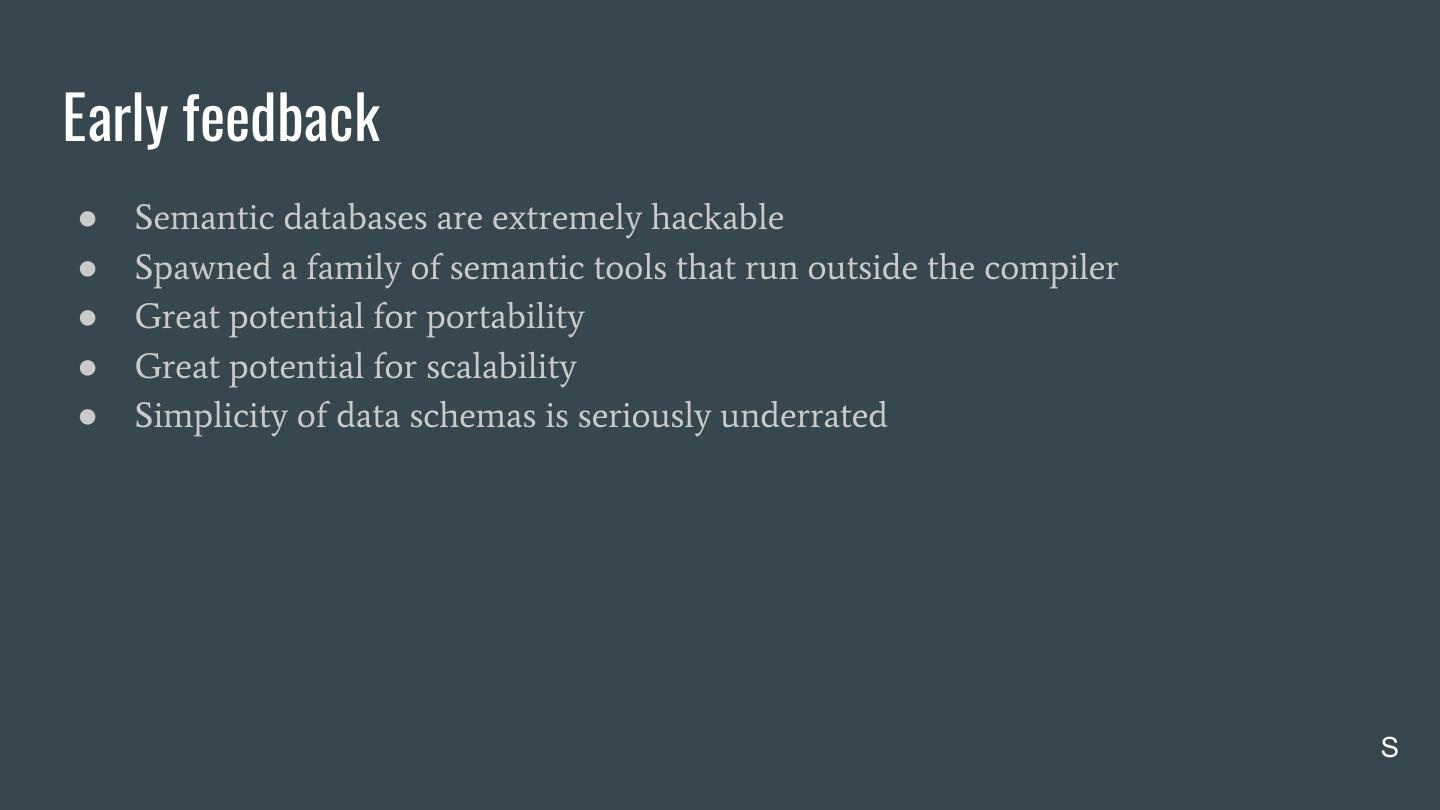- 快召唤伙伴们来围观吧
- 微博 QQ QQ空间 贴吧
- 文档嵌入链接
- 复制
- 微信扫一扫分享
- 已成功复制到剪贴板
Semantic Tooling at Twitter (ScalaDays Copenhagen 2017)
展开查看详情
1 .
2 .
3 .Agenda ● State of developer tools at Twitter ● Vision of nextgen semantic tooling ● Proposed technology stack S
4 .twitter
5 .State of Source ● Monorepo ● Consistent build ○ Now: retain agility! ● Persistent rumor: “Twitter is writing less Scala” ○ False. ○ JDK8 landed in Source about 1 year ago. In that period: ■ Scala codebase grew by 35% ■ Java codebase grew by 19%
6 .Rewind: Monorepos? Monorepos. ● No diamonds ● Atomic cross-project changes ● Top-to-bottom continuous integration testing ● Linear change history ● No binary incompatibilities except at the boundary ○ ...although really just an argument for source distributions...?
7 .Achieving the promise of a monorepo ● Requires tooling! ● Previous talk: Pants (ref). ● Previous talk: dependency hygiene (ref). ● Today: semantic tooling!
8 .A day in the life of a core lib dev ● Not a bad environment! ○ Pre-commit unit and integration testing of all dependents ○ Atomic commit of changes to libraries and their consumers ○ Thousands of examples of usage of most APIs ○ Users sit right down the hall ● But not perfect. ○ How do I remove an API?
9 .“Avoid deprecations in the common case” 0899f3e util-core: Remove deprecated method Future.get(Duration) ● Dead code in a monorepo is not 28 files changed, 293 insertions(+), 210 deletions(-) like dead code in polyrepos! 60b8b21 util-core: Remove deprecated Future.get 53 files changed, 403 insertions(+), 299 deletions(-) ● Rewriting `Future.get` to 6ed301d Replace calls to Future.get with Await.result `Await.result` (last year) 116 files changed, 1113 insertions(+), 956 deletions(-) 7deee17 Replace calls to Future.get with Await.result required a custom compiler 131 files changed, 923 insertions(+), 760 deletions(-) plugin 2855fa4 Replace calls to Future.get with Await.result 174 files changed, 1476 insertions(+), 1222 deletions(-) dfe0002 Replace calls to Future.get with Await.result 51 files changed, 991 insertions(+), 688 deletions(-) da6f09c Replace calls to Future.get with Await.result 80 files changed, 815 insertions(+), 535 deletions(-)
10 .State of semantic tooling ● Very coarse via target level dependencies: ○ ~2^16 targets, ~2^14 roots (tests+binaries) ● Slightly finer (class-level) semantic information via zinc analysis ○ ~2^22 class files (post codegen) ● Very fast text/regex based indexes ○ ~2^25 loc (pre codegen)
11 .State of semantic tooling (continued) ● Symbol level information available only in IDEs ● Very old Sourcegraph install recently deprecated ○ Legacy code for both companies: missing features, fragile integration ■ Compiler plugin specific to 1) Sourcegraph, 2) a compiler version ● *but are moving toward using LSP extensions (ref): great direction! ○ Not ruling out future open source collaboration. ● Pants support for scalafix (new!) and scalafmt ○ Not yet widely used internally ○ Big bang rewrite likely coming soon.
12 .vision
13 .Code comprehension ● Table stakes; must be: ○ Orders of magnitude faster than grep ○ Find references-to ○ Find definition-of a symbol ● Going further toward understanding with: ○ Inheritance relationships ○ Documentation ○ Type awareness
14 .Code review ● Context available for a patch ○ Warnings/errors from the compiler ○ Definitions/references/types on hover
15 .Code evolution ● Deprecations should be completely unnecessary for code that doesn’t escape the closed world! ● Decide whether to refactor by... ○ ...exploring class/trait relationships ○ ...filtering calls by scope or the call graph ● Then execute. ○ Scalafix! ○ Generic rewrite tools possible?
16 .Executing the vision ● High resolution, antifragile semantic extraction... ● Distributed, language-agnostic* semantic index... ● Integration with language-agnostic tools... E
17 .scalameta http://scalameta.org/
18 .Nextgen metaprogramming library for Scala ● Syntactic API (2014-) ○ Tokens ○ Abstract syntax trees ○ Parsers ○ Quasiquotes ● Semantic API (2017-) ○ An independent open-source foundation for semantic tools ○ Already used at Twitter and at the Scala Center ○ Recently published technology preview within scalameta 1.8.0
19 .Old-school semantic tooling for Scala ● Write a compiler plugin that runs after typer ● import global._ ● Fight with compiler internals ● Rewrite your tool when a new minor version of Scala is released
20 .Why old school didn’t work Huge surface of the compiler API ● Tens of thousands LOC ● Dozens of different modules ● Thousands of different methods
21 .First attempt (scalareflect, 2011) ● Reduce the API surface to several hundred most popular methods ● Guarantee stability across minor and even major Scala releases
22 .Second attempt (scalameta, 2014) ● Further “compress” the API surface to several dozen most popular methods ● New data structures to enable new “compressed” APIs ● Convert back and forth between compiler and new data structures
23 .Why these attempts didn’t work Still using compiler data structures ● Immense language-version-specific schema ● Very involved pre- and postconditions ● Require a running compiler ● Not serializable
24 .Third attempt (scalameta, 2017) ● Dumb data schema to represent semantic information ● Give up on bidirectional interop with compiler data structures ● Still use the significantly reduced API surface from the second attempt
25 .Semantic database ● Extremely simple data schema ● ~50 lines of protobuf code ● Supports resolved names, compiler messages, symbol denotations and sugars ● Technology preview for Scala 2.11.11 and Scala 2.12.2
26 .example
27 .Live demo: semantic db for an example Scala file package com.example class Printer { def print(msg: String): Unit = println(msg) } object Example { def main(args: Array[String]): Unit = { val msg = "Hello World" // Comment. new Printer().print(msg) } }
28 .Early feedback ● Semantic databases are extremely hackable ● Spawned a family of semantic tools that run outside the compiler ● Great potential for portability ● Great potential for scalability ● Simplicity of data schemas is seriously underrated S
29 .language-agnostic* semantic index?



































































